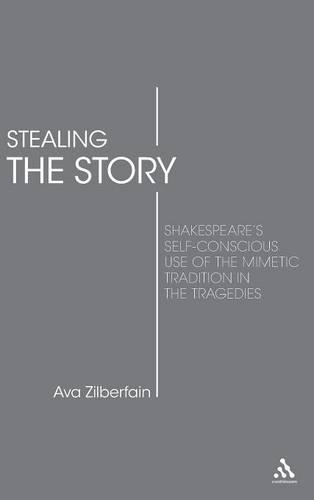
Stealing the Story: Shakespeare's Self-Conscious Use of the Mimetic Tradition in the Tragedies
(Hardback)
Publishing Details
Stealing the Story: Shakespeare's Self-Conscious Use of the Mimetic Tradition in the Tragedies
By (Author) Ava Zilberfain
Bloomsbury Publishing PLC
Continuum International Publishing Group Ltd.
1st June 2007
United Kingdom
Classifications
Adult Education
Non Fiction
Literary studies: c 1600 to c 1800
822.33
Physical Properties
Hardback
192
400g
Description
Shakespeare's plays investigate the implications of using the mimetic process - a process that invents by redefining personal and collective identities and reestablishing mythic representation, references, and allusions. This book focuses on Shakespeare's understanding that the creative repositioning of the point of origin to restructure existing devastation and to create an ideal world also give birth to destructive impulses. His dramas suggest that this regressive moment is formulated from associations, economic factors, family relationships, political factors, personal philosophies and affiliations, adn then are supplied structurally, linguistically, artistically, psychologically, culturally, politically, socially, and economically. Artistically and linguistically, his plays always return to the structures and institutions that have preceded them. Politically, his plays porpose that a crises in the concept of leadership is necessary for the emergence of hte totalitarian state. Confused with a society at the crossroads between feudalism and modernity, Shakespeare suggests that the destabilization of theocracies is a very early modern problem. One of hte paramount problems the modern world encounters as it moves ffrom feudalism to orthodoxy is the dismantling of existing structures adn systems necessary to the construction of the modern state. This reconstruction is based in dissatisfaction with present circumstances and this discontentment creates a nostalgic search for a lost paradise. But one is always abstracted from those fundamental and seminal elements that have comprised the foundation for those institutions, paradigms, and principles that have ensued since, because one cannot experience the previous moral and ideological contexts. In Shakespeare's works, sovereignty and succession are replaced by rhetoric and rationalization in plays such as Richard II. When he tries to locate the birth of moral corruption and contemplates teh very real possibility that political agenda invent a system that justifieds corruption, he turns to plays such as Macbeth where he is able to place the figuers of a fallen Adam and Eve vilified in the decision to do evil acts not in the contemplation of them. In Antony and Cleopatra, he investigates the painful process of recreating social, spiritual, and individual identities by manipulating and exploiting the mythic realm. In Hamlet contradictory signifiers create division, as a society, which has abandoned orality grows to trust misleading manifestations and representations. Finally, in plays such as King Lear the written word supercedes the spoken word. When one looks at Shakespeare's plays, it is apparent that he highlights the ominous quality implicit in re-creation as he marks the emergence of the totalitarian state and warns that the creative and generative impulse can give birth to destruction.
Reviews
Title mention in Oxford Journals Clippings: The Year's Work in English Studies, 2009
Author Bio
Ava Zilberfain is an independent scholar and poet living in New York City.
